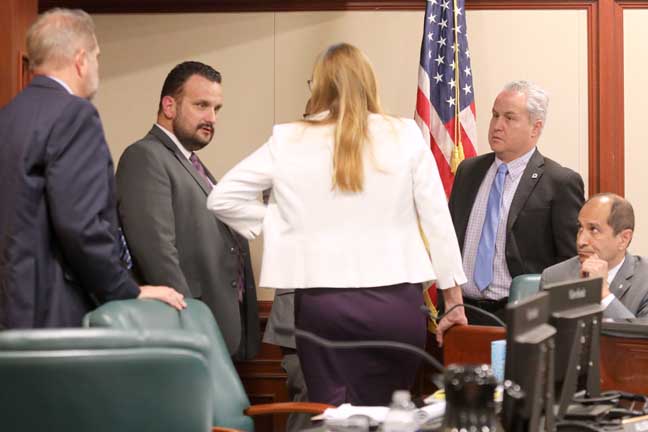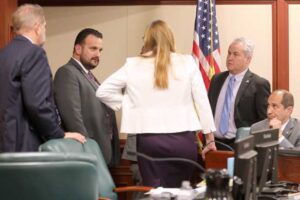Hateful calls prompt cessation of remote comments at public meetings

(L-R) Claremont City Manager Adam Pirrie, Mayor Ed Reece, City Attorney Alisha Patterson, Council member Jed Leano (hidden) Mayor pro tem Sal Medina and Council member Corey Calaycay consult following a rash of hateful remote public comments during Tuesday’s City Council meeting. Courier photo/Steven Felschundneff
by Steven Felschundneff | steven@claremont-courier.com
Normally, the headline from Tuesday’s Claremont City Council meeting would have been something along the lines of, “Council hears recommendation for allocation of budget surplus.”
But Tuesday’s meeting was anything but normal.
During general public comment several people participating via Zoom leveled angry bigoted, racist, and antisemitic attacks, mostly aimed at the Jewish community but also at Black people and immigrants. These calls occupied almost the entire 15 minutes of public comment allocated for Zoom participation, and the callers continued disrupting the meeting any time Mayor Ed Reece invited public input on agendized items. The hate-filled calls returned at the end of the meeting for approximately 15 minutes.
The shocking incident prompted the city to announce Wednesday that it will discontinue remote public comment effective immediately due to “harassment by public speakers making anti-Semitic, bigoted, and racist remarks at its October 10, 2023 City Council meeting,” according to a press release from Public Information Officer Bevin Handel.

(L-R) Claremont City Manager Adam Pirrie, Mayor Ed Reece, City Attorney Alisha Patterson, Council member Jed Leano (hidden) Mayor pro tem Sal Medina and Council member Corey Calaycay consult following a rash of hateful remote public comments during Tuesday’s City Council meeting. Courier photo/Steven Felschundneff
The change applies to all public meetings governed by the Brown Act, including commissions and the City Council.
“I have made the administrative decision to discontinue the practice of accepting public comment remotely, which was established during the pandemic,” City Manager Adam Pirrie wrote in the press release. “While the First Amendment protects the disgusting and disturbing comments we heard last night, it is in the best interest of the City to remove the ability of outside callers to undermine the purpose of our meetings, which is to conduct business related to the Claremont community.”
City Attorney Alisha Patterson explained at the meeting that callers have a Constitutional right of free expression and there was nothing the council could do to prevent the hate speech. Claremont is not the only municipality this group has sought to disrupt, in fact it’s a growing trend across the state. Patterson said several jurisdictions have elected to limit Zoom participation to listen only in an effort to put an end to the hateful calls.
“The Brown Act, which governs public meetings in California, requires municipalities to offer the public a chance to provide public comments in person,” Handel wrote Wednesday. “Municipalities have the option of offering additional methods of public comment at their discretion.”
Council hears recommendation for allocation of budget surplus
Aside from of the unexpected uproar on Tuesday, council business did take place as per usual. Claremont City Manager Adam Pirrie’s staff report revealed the projected but unaudited general fund surplus for fiscal year 2022/2023 is $7,514,564.
“The audited financial statements for all-funds, including the General Fund for 2022-23, will be published at the end of this calendar year as part of the City’s Annual Comprehensive Financial Report (ACFR),” read the staff report. “In prior years, information provided in this report has generally not deviated materially from the final annual audited statements.”
The surplus includes $3,413,471 the city received in December 2022 when it sold a plot of vacant land at 451 W. Arrow Hwy. to Village Partners Ventures. The city acquired the land in 2018 from the former Claremont Redevelopment Agency for $405,000. The council will discuss how to spend the proceeds from the sale of the property during its priorities workshop in early in 2024.
The finance department recommended allocating $1 million of the surplus as a “discretionary payment” to CalPERS in an ongoing effort to pay down the city’s unfunded liability over its employee pension plans. Another $1 million will be siphoned off to bolster its Section 115 pension trust, an investment vehicle the city opened in 2021.
The amount of money the city owes to CalPERS can fluctuate by millions of dollars each year depending on how the state agency’s investments are performing. The Section 115 pension trust is intended as an alternate, less volatile savings vehicle the city can tap in the future to help pay down its debt to CalPERS. It’s intended to be a diversification of the city’s total effort to pay off this debt. The fund has a “moderately conservative” asset allocation, which Pirrie described as performing well.
Council member Corey Calaycay voted against investing in the pension trust because there is no guarantee the money will be used to pay down the city’s unfunded liability. He expressed concern that future councils could siphon the money off to pay yearly pension related expenses. In the past he has indicated a preference that all discretionary payments be made directly to CalPERS.
Aside from the pension trust, the council agreed unanimously on all other proposals from the finance staff.
The council elected to amend the city’s reserve policy for its Operating and Environmental Emergency Reserve, which was set at 25% of operating expenditures and transfers out. The new policy will increase that to 30%, and the council authorized $1,810,698 of the surplus be allocated to the reserve to meet that benchmark, bringing the reserve to $9,337,719.
An additional payment of $290,395, or any remaining surplus following the audit, will go to the city’s Equipment and Facility Revolving Reserve.
During his budget presentation, Pirrie said that general fund revenues and transfers in for the fiscal year were $39,622,685 against an adjusted budget of $30,758,790.
In addition to the proceeds from sale of 451 W. Arrow Hwy., the surplus was driven by a huge boost in sales, utility, and property taxes. The city received $1,409,000 more sales taxes than included in the budget, for a total of $8,134,093; user utility taxes were $1,043,000 higher than expected for a total of $5,418,077; and property taxes were $622,000 more than budgeted for a total of $12,117,600.
Revenues from a series of other sources were above budget as well, including licensing and permits, which exceeded expectations by $746,000; use of money and property was over budget by $450,000; charges for services brought in $220,000 more than expected; and there was a boost of $233,000 for transit occupancy taxes.
The job of presenting the budget update fell on the city manager’s shoulders because Claremont’s relatively new finance director, Nishil Bali, resigned unexpectedly in July. Pirrie said Bali did not give a reason for his departure and added his 11-month tenure was not long enough to evaluate his job performance. The city has hired Jeremy Starkey as its new finance director. His first day on the job will be Monday, October 16.







0 Comments